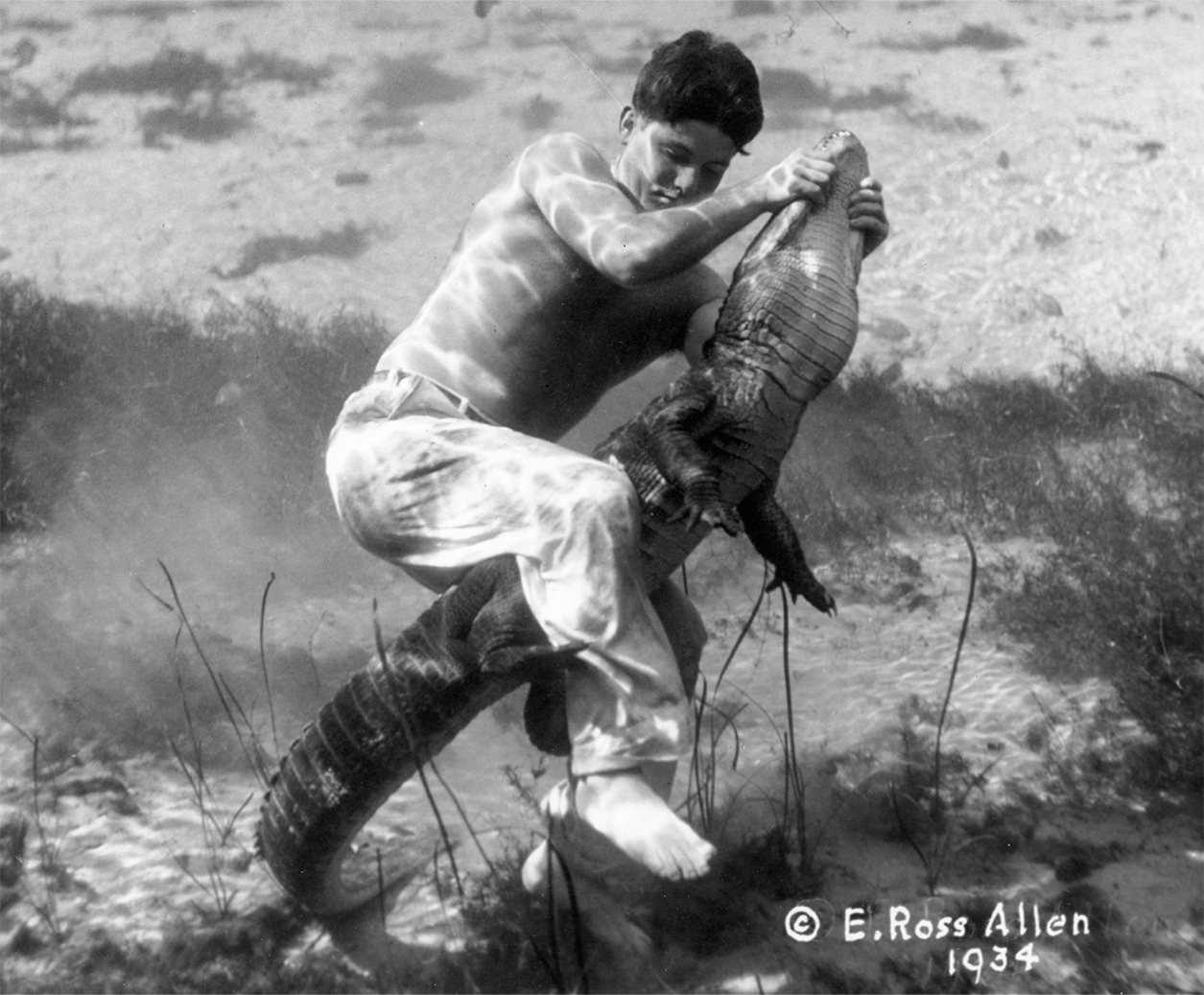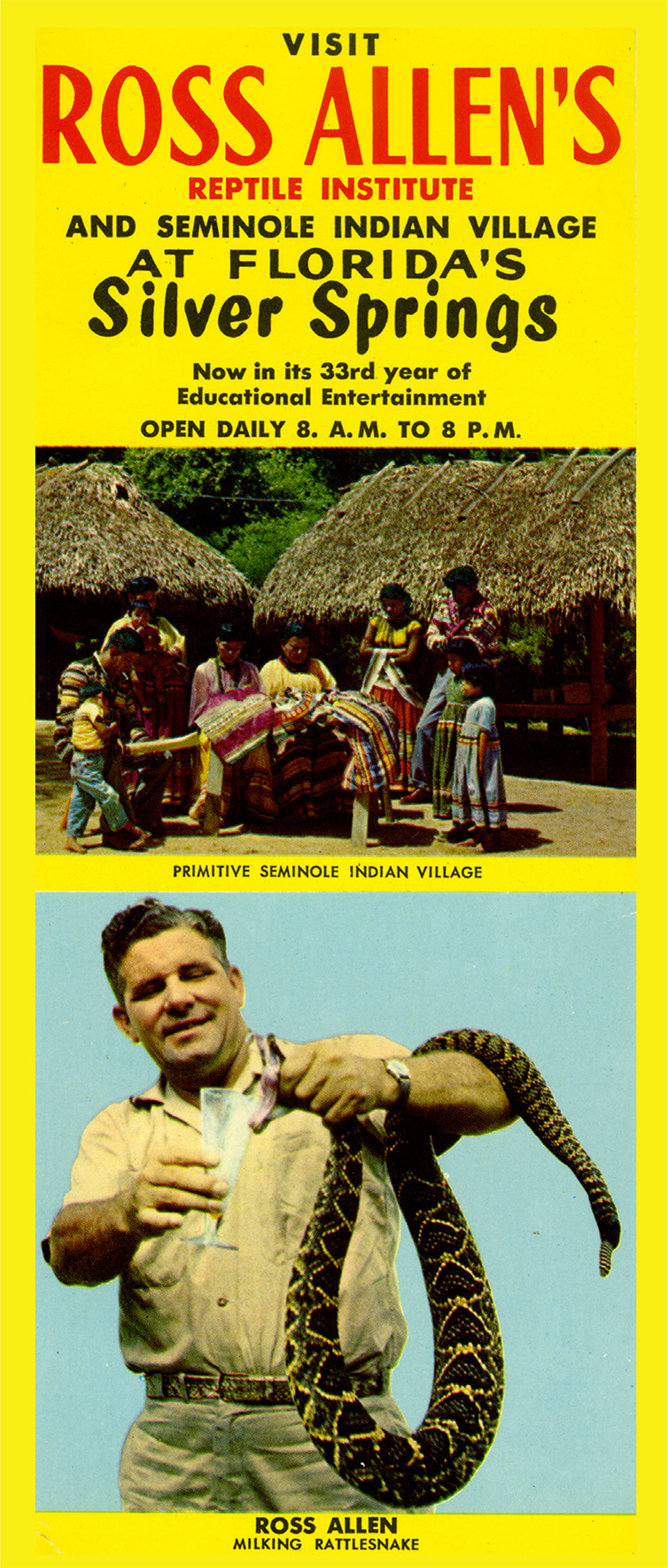The Ross Allen Reptile Institute was long a major attraction at Silver Springs and later included a research lab.

In the days before modern theme parks like Walt Disney World and Universal Orlando, Silver Springs was one of the most popular attractions in the country. Starting in 1924, families from near and far would make annual pilgrimages to Florida to ride glass-bottom boats, view wildlife and have a photograph taken with the iconic spring in the background.
While there were multiple concessions located at Silver Springs, the Ross Allen Reptile Institute was one of the main attractions. Although watching someone handle live snakes and alligators may be considered mundane by today’s entertainment standards, in the era before special effects and high-speed roller coasters, a reptile show was exciting stuff.
Ross Allen was not born in the southern swamps but it did not take long for him to find his calling after his family moved to Florida. He was born in Pittsburgh, Pennsylvania, in 1908 and the family moved to Ohio when he was around 10 years old. A real estate boom advertising easy money in the Sunshine State lured the Allen family to Winter Haven in 1924, when Ross was 16.
Those were formative years and he worked as a lifeguard, earned the rank of Eagle Scout and enrolled in John B. Stetson University (now Stetson University). He attended classes for a single semester, but in 1927 the failing economy caused the family to return to Ohio (Stetson University later awarded Allen an honorary degree for his research in the field of herpetology).
At the age of 21, Allen had seen enough to know he loved the still undeveloped wilds of Florida. He lasted several weeks in Ohio, then moved back to Winter Haven to pursue work with reptiles and taxidermy. His home and workshop included an outbuilding for taxidermy work and reptile research and a fenced lot. It seemed he had found his place but after several alligators escaped into the surrounding neighborhood, city officials requested that he change his business or relocate.
 By this time Allen had struck up a friendship with Newt Perry, who worked at Silver Springs. Allen and Perry had both been lifeguards and were excellent swimmers. By 1929, Allen had moved to establish his dream business, the Ross Allen Reptile Institute at Silver Springs. Shortly afterward, Allen also assumed management of the adjacent Seminole tourist camp. That merger was reported to be the result of a dispute between the Seminole families and the former proprietor Charles Metzger.
By this time Allen had struck up a friendship with Newt Perry, who worked at Silver Springs. Allen and Perry had both been lifeguards and were excellent swimmers. By 1929, Allen had moved to establish his dream business, the Ross Allen Reptile Institute at Silver Springs. Shortly afterward, Allen also assumed management of the adjacent Seminole tourist camp. That merger was reported to be the result of a dispute between the Seminole families and the former proprietor Charles Metzger.
As tourism at Silver Springs grew in the following years, the reptile institute expanded as well. Carl Ray Sr. and W.M. “Shorty” Davidson, who ran the operation, were skilled promoters and by the mid-1930s, Silver Springs was a major tourist attraction. By 1935, the reptile institute featured a new pioneer-style log cabin that served as both an entrance and lucrative gift shop. Allen’s attractions at Silver Springs had grown to include a research lab, live reptile shows, both storefront and mail order sales departments and an active Seminole tourist camp.
During these years, Allen was a busy man. He was married several times, founded the International Crocodile Society and served as the first president, appeared in short films and newsreel clips, worked as a stuntman and reptile handler for movies that were filmed at Silver Springs, hosted “camporees” for countless Boys Scouts and demonstrated how to extract venom from snakes to create antivenin.
The sales of live snakes, meat and skins generated income and Allen was known by many to offer top dollar for reptiles. While some herpetologists now look back with a critical eye at this past commercialization, Allen had no way of knowing how badly some species would decline in the coming years (mainly due habitat destruction and indiscriminate killing by people).
In 1962, Ray and Davidson sold their holdings to ABC-Paramount with the agreement that proprietors like Allen would stay on. He remained active at Silver Springs until 1975, when he left to pursue new ventures. He presented reptile talks at the Alligator Farm in St. Augustine for a short time then began plans for a new attraction called Alligator Town in Lake City. Sadly, Allen fell ill and passed away in 1981, only a month before the attraction was set to open. He was 73 years old.
A glimpse into Ross Allen’s legacy can be found on display at the Silver River Museum & Environmental Education Center, which is open to the public from 10am to 4pm every Saturday and Sunday.
Scott Mitchell is a field archaeologist, scientific illustrator and director of the Silver River Museum & Environmental Education Center at 1445 NE 58th Avenue, inside Silver Springs State Park. To learn more, go to silverrivermuseum.com.






